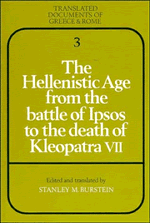Book contents
- Frontmatter
- Contents
- Volume Editor's Introduction
- Abbreviations
- Symbols
- Chapter 1 From Ipsos to Korupedion (301–281)
- Chapter 2 The Seleucid Kingdom
- Chapter 3 The Greeks in Baktria and India
- Chapter 4 Macedon and the Greeks of Europe
- Chapter 5 Pergamon
- Chapter 6 Ptolemaic Egypt: kingdom and empire
- Glossary
- Appendixes
- Indexes
Chapter 1 - From Ipsos to Korupedion (301–281)
Published online by Cambridge University Press: 01 June 2011
- Frontmatter
- Contents
- Volume Editor's Introduction
- Abbreviations
- Symbols
- Chapter 1 From Ipsos to Korupedion (301–281)
- Chapter 2 The Seleucid Kingdom
- Chapter 3 The Greeks in Baktria and India
- Chapter 4 Macedon and the Greeks of Europe
- Chapter 5 Pergamon
- Chapter 6 Ptolemaic Egypt: kingdom and empire
- Glossary
- Appendixes
- Indexes
Summary
Ephesos honors Nikagoras, son of Aristarchos, from Rhodes, ambassador of Demetrios Poliorketes and Seleukos. Ephesos, 300/299. Wall block from the temple of Artemis.
OGIS 10; *I. Ephesos 5.1453; cf. Plutarch, Demetrios 31.2.
Tarn, Gonatas 11–12; Will, Histoire 1.87–9;J. Seibert, Historische Beiträge zu den dynastischen Verbindungen in hellenistischer Zeit (Wiesbaden 1967) 48–50.
Resolved by the Boule and the People. Philainetos, son of Philophron, introduced the motion. Since | Nikagoras, son of Aristarchos, a Rhodian, having been sent by the kings, Demetrios | and Seleukos (I), to both the Ephesian people and the other Greeks | and having been brought before the People, spoke about the relationship existing ∥ between them and about the good will which they continue to have for | the Greeks, and (since) he renewed the friendship which he previously had | with the city, it has been resolved by the Boule and the People | that they praise Nikagoras for the good will which he continues to have for the | kings and the People and crown him with a gold wreath ∥ and announce (it) at the Ephesia in the theatre. They shall also grant citizenship to him | [on an equal] and like (basis) just as to the other benefactors, and he shall also have | a front seat at the contests and the right of import and export both in war | [and in] peace and exemption from taxation for whatever he imports or exports {or} to his own home | [and the right of access to] the Boule and People immediately after the sacred business.
- Type
- Chapter
- Information
- Publisher: Cambridge University PressPrint publication year: 1985



